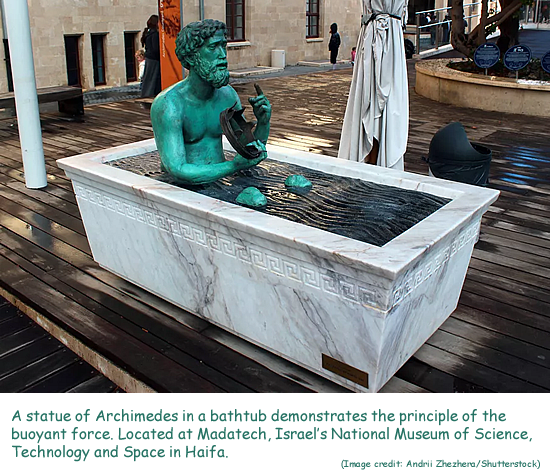Archimedes Principle
The story goes that one day Archimedes was thinking about the problem while taking a bath. As he lay floating in the bathtub he thought about the effect that water had on his body, how it seemed "weightless".
Suddenly he realized that all bodies "lose" a little weight when placed in water, and the bigger their volume, the more weight they lose. The weight of the King's crown and its apparent loss of weight in water would tell him if it were made out of pure gold. Archimedes shouted "Eureka!" (I have found it!) and rushed out into the street naked to announce that he had solved the problem. Today the effect he observed is called Archimedes' Principle and the Displacement Can we use in Physics is called a Eureka Can!
A body immersed in a fluid is buoyed upward by a force equal in magnitude to the weight of the fluid displaced by the body. This buoyant force is a consequence of the fact that there is increasing pressure with increasing depth in a fluid in a gravitational field. The Archimedes Principle applies to both floating and submerged bodies and to all fluids (a fluid is a liquid or a gas - something that 'flows'). It explains not only the buoyancy of ships and other vessels in water but also the rise of a balloon in the air and the apparent loss in weight of objects underwater. Consider a cylinder immersed in a fluid.
Here's an interesting one.... Further reading:The case of the Golden Crown - a high level discussion of the traditional tale Archimedes Biography
|
Follow me...
|


 Tradition tells
us that in Archimedes' time the King was suspicious about the purity
of the gold in a crown that had been made for him by a craftsman. He
asked Archimedes to find a way to determine if it was solid gold or
a base metal covered in gold. He wanted to be sure he wasn't being cheated.
Tradition tells
us that in Archimedes' time the King was suspicious about the purity
of the gold in a crown that had been made for him by a craftsman. He
asked Archimedes to find a way to determine if it was solid gold or
a base metal covered in gold. He wanted to be sure he wasn't being cheated. 




